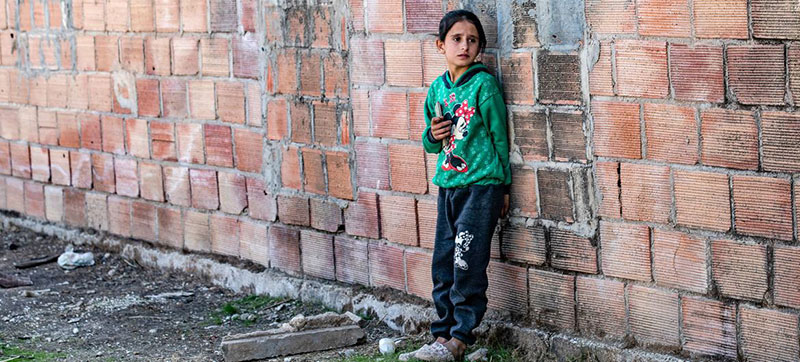 Syria
Syria New York: Four days after ISIL terrorists launched apparently coordinated attacks on a large prison in northeast Syria in a bid to free fighters detained there, the UN Human Rights Office, OHCHR, described the still unfolding situation on Tuesday as “deeply troubling”.
The attempted jailbreak began last Thursday with two coordinated car bomb attacks to free suspected ISIL members – sparking violence between ISIL fighters and Kurdish-led Syrian Defence Forces (SDF) which control the prison, including in residential areas of Al-Hasekeh.
“We are particularly disturbed by reports that a significant number of boys, possibly several hundred, are held there and are extremely concerned for their safety and well-being”, OHCHR spokesperson Ravina Shamdasani told journalists in Geneva.
“The detention of children should, as ever, be a measure of last resort and for the shortest appropriate period of time”.
Curfew declared
The Ghweiran prison is one of the largest detention centres in northeast Syria, housing an estimated 5,000 male detainees, many in prolonged pre-trial detention or internment and includes numerous suspected ISIL fighters from Iraq and Syria.
While the SDF subsequently said that it had recaptured a number of the escapees, many are reportedly hiding in Al-Hasakeh city, according to Ms. Shamdasani.
Reports from the prison say that close to 300 mostly detainees have been killed during fighting in and around the prison, run by the Western coalition-backed Kurdish forces.
“The SDF has declared a curfew in all areas under its control in the city and has, with air support from international forces, surrounded the prison”, she said.
Hostage situation
However, detainees, many of whom are suspected to be ISIL members, are reportedly in control of the prison’s main building and have taken some prison staff hostage.
Moreover, fearing further ISIL attacks, thousands of people have fled the area.
“We remind all parties to the conflict, as well as governments with influence over the parties, that international law requires them to do their utmost to protect civilians, including in the planning and execution of military and security operations”, said the OHCHR official.
Squalid prisons
These latest developments highlight the desperate situation of thousands of detainees, including suspected ISIL members, across Syria.
“We have previously warned about the squalid and insecure state of detention facilities run by the SDF, where detainees are held in overcrowded conditions, do not have access to proper medical care, and cannot see their families”, reminded Ms. Shamdasani.
She recalled several riots, instigated by ISIL-linked detainees and attacks on detention facilities by ISIL sleeper cells, as appears to have been the case in Thursday’s attack on Ghweiran prison.
“We remain deeply concerned by the situation of thousands of Syrians, Iraqis and ‘third country nationals’ with presumed family links to ISIL members, who are confined in overcrowded displacement camps such as Al-Hol and Al-Roj in northeastern Syria”, the OHCHR spokesperson stated.
‘Chaos and carnage’
An independent human rights expert on Tuesday also zeroed in on the welfare of close to 700 children being held at the prison, noting that boys as young as 12 are living “amid the chaos and carnage in the jail”.
Fionnuala Ní Aoláin, the Special Rapporteur on the promotion and protection of human rights while countering terrorism, called on States to urgently repatriate all their young nationals being detained in Syria who have been “tragically being neglected by the own countries through no fault of their own except they were born to individuals allegedly linked or associated with designated terrorist groups”.
Their failure to repatriate these children...beggars belief – UN rights expert
The UN expert upheld that the treatment of hundreds of boys who have been detained in “grotesque prison conditions is an affront to the dignity of the child and the right of every child to be treated with dignity”, adding that “their lives in the prison have always been at risk”.
“The abject refusal of States to repatriate their children is a contributory factor in the security and human rights morass that has ignited in Al-Hasakeh in recent days”, said Ms. Ni Aoláin, who last year identified 57 States with nationals held in Syria’s camps.
“Their failure to repatriate these children, who should rightly be considered victims of terrorism and as children in need of protection under international law, beggars belief”.
‘Horrific consequences’
The UN expert explained that many of the boys, who were forcibly separated from their family member in recent years, have been denied their most fundamental human rights their entire lives.
“They have been held arbitrarily and never participated in any legal process that would justify depriving them of their liberty, and in conditions that constitute torture, cruel and degrading treatment under international law”, she continued.
“Treating boys as a distinct class, refusing to recognize in practice their rights as children is a form of gender discrimination that has had horrific consequences for these children now caught up in the violent confrontation at Al-Hasakeh prison”.
Ms. Ni Aoláin called on all States and others operating in northeast Syria to protect civilians, and children being held in the prison.
Special Rapporteurs are appointed by the Geneva-based UN Human Rights Council to examine and report back on a specific human rights situation. The positions are honorary and the experts are not paid for their work.
Support Our Journalism
We cannot do without you.. your contribution supports unbiased journalism
IBNS is not driven by any ism- not wokeism, not racism, not skewed secularism, not hyper right-wing or left liberal ideals, nor by any hardline religious beliefs or hyper nationalism. We want to serve you good old objective news, as they are. We do not judge or preach. We let people decide for themselves. We only try to present factual and well-sourced news.







